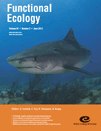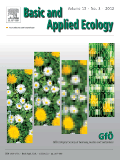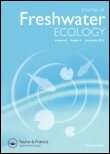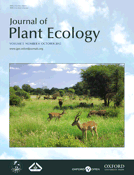
FUNCTIONAL ECOLOGY
Scope & Guideline
Pioneering Research at the Intersection of Ecology and Evolution
Introduction
Aims and Scopes
- Functional Traits and Ecosystem Processes:
The journal focuses on how functional traits of organisms influence ecosystem processes, such as nutrient cycling, productivity, and food web dynamics. This includes studies on plant traits, animal behavior, and microbial functions. - Responses to Environmental Change:
Research published in Functional Ecology often examines how species and ecosystems respond to environmental changes, including climate change, urbanization, and habitat modification. This encompasses physiological, behavioral, and community-level responses. - Inter-species Interactions and Community Dynamics:
The journal emphasizes studies that explore the interactions among species, such as predation, competition, and mutualism, and how these interactions shape community structure and biodiversity. - Cross-disciplinary Approaches:
Functional Ecology promotes interdisciplinary research that combines ecology with evolutionary biology, physiology, and biochemistry, fostering a comprehensive understanding of ecological phenomena. - Biodiversity and Ecosystem Functioning:
The relationship between biodiversity and ecosystem functioning is a core theme, with articles addressing how species diversity affects ecosystem resilience, stability, and service provision.
Trending and Emerging
- Impact of Climate Change on Ecosystem Dynamics:
Research focusing on the effects of climate change on ecological interactions, species distribution, and ecosystem functioning is increasingly prevalent. This includes studies on thermal tolerance, phenological shifts, and adaptations to changing climates. - Microbial Ecology and Soil Health:
There is a growing emphasis on the role of soil microbial communities in ecosystem functioning, particularly in relation to nutrient cycling, carbon storage, and plant-microbe interactions. - Urban Ecology and Anthropogenic Effects:
Studies examining the ecological impacts of urbanization, including changes in species interactions, functional diversity, and ecosystem services, are gaining traction as urban areas expand. - Functional Trait Variation and Intraspecific Diversity:
Research is increasingly focusing on intraspecific variation in functional traits and how this diversity affects ecological performance, resilience, and adaptive capacity in changing environments. - Ecosystem Services and Human Well-being:
There is a rising interest in linking ecological research to ecosystem services and human well-being, emphasizing the importance of biodiversity and ecosystem functioning for sustainable development.
Declining or Waning
- Studies Focused Solely on Taxonomic Diversity:
There has been a noticeable decline in papers that prioritize taxonomic diversity without considering functional implications. The emphasis has shifted towards understanding functional diversity and its ecological consequences. - Traditional Laboratory Studies:
Research relying solely on controlled laboratory experiments is less frequent, as there is a growing preference for field studies that address real-world ecological dynamics and incorporate complex environmental interactions. - Static Ecological Models:
The use of static models that do not account for temporal dynamics or ecological interactions is decreasing. Researchers are increasingly favoring dynamic models that incorporate variability and complexity in ecological systems. - Focus on Single Species Studies:
There is a reduction in studies that focus on single species in isolation. Instead, there is a trend towards examining multi-species interactions and community-level dynamics. - Descriptive Ecology without Functional Insights:
Descriptive studies that lack functional insights or implications for ecosystem processes are becoming less common, as the field moves towards integrating functional traits into ecological research.
Similar Journals

Folia Oecologica
Nurturing Collaboration for Ecological Preservation.Folia Oecologica is a distinguished open-access journal published by WALTER DE GRUYTER GMBH, focusing on critical research in the fields of agricultural and biological sciences, ecology, and forestry. Established as a vital platform for the dissemination of knowledge, this journal has been providing free access to its valuable content since 2017, catering to an international audience engaged in environmental and ecological studies. With its ISSN 1336-5266 and E-ISSN 1338-7014, Folia Oecologica has earned notable ranks in Scopus, placing it in the 62nd percentile for Agricultural and Biological Sciences and the 50th percentile for Environmental Science. The journal's commitment to high-quality research is reflected in its positions in the Q2 and Q3 quartiles across various categories in 2023. As it converges years from 2006 to 2024, Folia Oecologica continues to foster scholarly dialogue and collaboration among researchers, professionals, and students, making significant contributions to the understanding and preservation of our ecological systems.

ACTA OECOLOGICA-INTERNATIONAL JOURNAL OF ECOLOGY
Pioneering Research for Ecological UnderstandingACTA OECOLOGICA-INTERNATIONAL JOURNAL OF ECOLOGY, published by Elsevier, stands as a prominent platform for disseminating innovative research in the diverse field of ecology. Operating since 1983 and continuing to make significant contributions into 2024, this journal features critical studies that advance our understanding of ecological systems, behaviors, and conservation efforts. With an impressive Q2 ranking in both the ecology and nature conservation categories, it exemplifies high-quality scholarship, reflected in its Scopus rankings—#74 in Environmental Science and #254 in Agricultural and Biological Sciences. Researchers, professionals, and students in the field are invited to explore the latest findings and methodologies that address pivotal ecological issues. As a journal committed to fostering academic collaboration, ACTA OECOLOGICA is essential for anyone dedicated to enhancing their comprehension of ecological dynamics and advancing sustainability practices globally.

ECOLOGICAL RESEARCH
Advancing ecological understanding through rigorous research.ECOLOGICAL RESEARCH is a prestigious academic journal published by WILEY, dedicated to advancing the field of ecology and its associated disciplines. Since its inception in 1986, the journal has consistently provided a platform for high-quality, peer-reviewed research, contributing significantly to the understanding of ecological systems and their complexities. With an impressive 2023 impact factor reflected in its Q1 ranking in the category of Ecology, Evolution, Behavior, and Systematics, it stands among the top journals in its field, as evidenced by its Scopus rank of #192 out of 721 and placement in the 73rd percentile. While accessible through standard subscription models, this journal plays an essential role in disseminating crucial findings and innovative methodologies to researchers, professionals, and students alike. With a commitment to fostering ecological knowledge and collaboration, ECOLOGICAL RESEARCH continues to influence ecological practices and policies, shaping the future of research in this critical area.

FOLIA GEOBOTANICA
Bridging the gap between ancient ecosystems and modern plant science.FOLIA GEOBOTANICA, published by Springer, is a distinguished journal dedicated to advancing the fields of Paleontology and Plant Science through the dissemination of high-quality research. With an ISSN of 1211-9520 and an E-ISSN of 1874-9348, this journal has been pivotal in providing a platform for innovative studies from 1994 to 2024. Notably, FOLIA GEOBOTANICA holds a Q3 ranking in Paleontology and a Q2 ranking in Plant Science as of 2023, affirming its relevance and contribution to the scholarly community. The journal is located in the Netherlands at VAN GODEWIJCKSTRAAT 30, 3311 GZ DORDRECHT, and is not an Open Access publication, ensuring comprehensive review processes and scholarly integrity. With Scopus rankings that place it in the 50th percentile for Plant Science and 46th for Paleontology, FOLIA GEOBOTANICA continues to attract researchers, professionals, and students who are keen to explore the intricacies of plant ecology and fossil records, thereby fostering a deeper understanding of ecological and evolutionary patterns.

Nature Ecology & Evolution
Fostering transformative ideas for a sustainable future.Nature Ecology & Evolution is a premier journal that serves as a cornerstone for cutting-edge research in the dynamic fields of ecology, evolution, behavior, and systematics. Published by NATURE PORTFOLIO, this journal, with the ISSN 2397-334X, emphasizes high-quality, impactful studies that advance our understanding of ecological interactions and evolutionary processes. With an impressive Scopus ranking placing it in the 99th percentile—#6 out of 721 in Ecology, Evolution, Behavior and Systematics and #5 out of 461 in Environmental Science Ecology—it is classified as a Q1 journal, highlighting its significance in the research community. Established in 2016, it continues to foster an open dialogue among researchers and practitioners while facilitating the dissemination of transformative ideas that shape environmental policy and conservation strategies. While access to articles is restricted, the journal's robust impact factor underscores its relevance in scholarly discourse. Researchers, professionals, and students are encouraged to engage with the current trends and discoveries published in this leading journal, which thrives on addressing the challenges and complexities of our natural world.

BASIC AND APPLIED ECOLOGY
Fostering groundbreaking research in the heart of ecology.BASIC AND APPLIED ECOLOGY, published by Elsevier GmbH in Germany, stands out as a premier journal in the field of ecology, evolution, behavior, and systematics. With its ISSN 1439-1791 and E-ISSN 1618-0089, the journal enjoys a distinguished reputation, evidenced by its classification in the Q1 category for Ecology in 2023 and impressively ranking #89 out of 721 in this domain according to Scopus. Since its inception in 2000, it has served as a vital platform for disseminating high-quality research that bridges theoretical insights and practical applications in ecology. Researchers, professionals, and students alike can look forward to the latest findings that not only foster a deeper understanding of ecological processes but also inform sustainable practices crucial for our environment. As the journal continues its journey through to 2024, it remains committed to advancing ecological knowledge and supporting innovative research in an ever-evolving field.

JOURNAL OF FRESHWATER ECOLOGY
Exploring the depths of aquatic science and ecology.JOURNAL OF FRESHWATER ECOLOGY, published by Taylor & Francis Inc, is an esteemed source of research dedicated to advancing the understanding of freshwater ecosystems. Established in 1981, this Open Access journal has provided a platform for innovative studies and groundbreaking articles relevant to the fields of Aquatic Science and Ecology. With its HIndex reflecting a commitment to quality scholarship, the journal is currently classified in the Q3 category for both Aquatic Science and Ecology, Evolution, Behavior and Systematics, indicating its respectable impact within these disciplines. The journal ranks within the 45th percentile in Ecology and the 41st percentile in Aquatic Science on Scopus, highlighting its relevance to a global audience of researchers and practitioners. By facilitating unrestricted access to research findings since 2017, JOURNAL OF FRESHWATER ECOLOGY aims to enrich our understanding of freshwater systems and their conservation, making it an essential resource for those invested in ecological research and environmental sustainability.

Journal of Plant Ecology
Advancing the Frontiers of Plant EcologyJournal of Plant Ecology, published by Oxford University Press, is a premier journal dedicated to advancing the scientific understanding of plant ecology. With an ISSN of 1752-9921 and an E-ISSN of 1752-993X, this journal has established itself as a leading resource in the field, maintaining a prestigious Q1 ranking across multiple categories in the 2023 Scopus rankings, including Ecology, Evolution, Behavior and Systematics and Plant Science. The journal's commitment to high-quality research is underscored by its influence in agricultural and biological sciences, reflected in its competitive percentiles. While currently not offering open access, its comprehensive scope spans various ecological issues critical to understanding plant interactions and ecosystems, making it an essential read for researchers, educators, and students alike. The Journal of Plant Ecology not only facilitates the dissemination of vital findings but also fosters collaboration within the global scientific community. Discover more about the latest innovative research and key developments in plant ecology, and contribute to the dialogue that shapes our understanding of environmental stewardship and biodiversity conservation.

BMC Ecology and Evolution
Exploring the intricate dance of ecology and evolution.BMC Ecology and Evolution is a premier open access journal published by BMC, dedicated to advancing our understanding of ecological and evolutionary processes in a rapidly changing world. With a growing e-ISSN of 2730-7182, this journal serves as a vital platform for researchers and scholars looking to disseminate high-quality research findings that explore the interplay between ecological dynamics and evolutionary developments. Operating from London, England, BMC Ecology and Evolution provides seamless access to valuable research, ensuring that significant studies are available to a global audience without barriers. The journal fosters a collaborative atmosphere, welcoming diverse research methodologies and interdisciplinary approaches, thus making it a crucial resource for professionals, students, and academics alike. Its commitment to open access ensures that pioneering research in ecology and evolution is readily available, encouraging the continuous exchange of ideas and knowledge in the field.

Science of Nature
Advancing Multidisciplinary Insights into Nature.Science of Nature, a prestigious journal published by SPRINGER HEIDELBERG, stands at the forefront of multidisciplinary research, encompassing key areas within Ecology, Evolution, Behavior, and Systematics. With an impressive history tracing back to 1913 and a continued focus on innovative scientific inquiry, this journal has earned a commendable Q2 ranking in both Ecology and Medicine as of 2023. The journal is accessible through its Open Access options, promoting wider dissemination of knowledge and research breakthroughs. As a vital resource for researchers, professionals, and students alike, Science of Nature not only reflects the dynamic nature of biological sciences but also contributes significantly to advancing our understanding of complex ecological relationships and medical developments. Recognized by its ISSN 0028-1042 and E-ISSN 1432-1904, this journal is a must-read for those seeking to stay updated with the latest findings and discussions in the field.